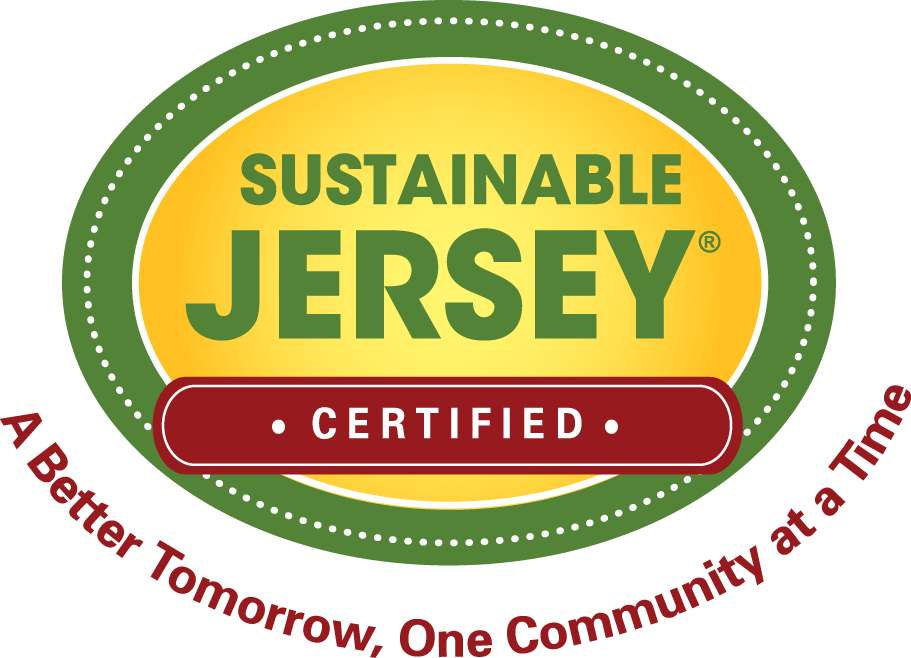Sustainability in Action
In the Fall 2024 issue of the Sustainable Jersey Newsletter:
- Philip’s Academy Charter School Plants 31 Trees and Grows Community Health and Resilience (Essex County)
- Communities Take Action to Make Leaf and Lawn Maintenance More Sustainable
- Reading-Fleming Intermediate School Turns Unused Area Into a Pollinator Garden and Outdoor Classroom (Hunterdon County)
- Sustainable Jersey for Schools Celebrates 10 Years
- Make the Switch to a Cleaner and Greener Fleet
- New Jersey’s Decarbonization Efforts and Energy Efficiency Initiatives Strengthened
Philip’s Academy Charter School Plants 31 Trees and Grows Community Health and Resilience (Essex County)
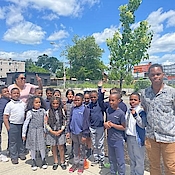
In 2024, Philip’s Academy Charter School planted 31 beautiful shade trees along several streets leading to the school thanks to a Trees for Schools grant of nearly $150,000. The school is using the grant over a three-year period to fund costs associated with planning, site preparation, trees, planting, watering, monitoring and other related expenses.
“This project is such a proud moment for Philip's Academy,” said Natalie Guy, Chief Operating Officer at Philip’s Academy Charter School. “It has provided our school with the opportunity to beautify and enhance the environment of our immediate school property and the surrounding areas. The trees have important environmental benefits as well. We are grateful!”
Philip’s Academy Charter School collaborated with professional forester and Newark native, Quanika Stover, and the New Jersey Tree Foundation to create a plan for, and plant, the trees. Existing street concrete was cut and removed to make room for the tree pits. Tree pits need to be as large as possible to allow for ample growing space for tree roots and crown. As part of the project, the school cut 17 pits into the concrete and expanded five tree pit areas.
Central to Philip’s focus on healthy living is the EcoSpaces program, a multidimensional co-curricular program that incorporates the school’s rooftop garden, innovative teaching kitchen and world-class culinary team. This effort is designed to give students the tools to lead healthy and environmentally productive lives in the 21st century. The students participated in three tree plantings with their EcoSpaces instructor, a forester and tree planting crew who educated multiple classes ranging from pre-Kindergarten through 8th grade on the tree planting process.
In the future, the school plans to use the remaining grant funds to purchase a 50-gallon rain barrel to capture rainwater that will be used to continue the tree watering process critical to ensuring these young trees thrive. The culmination of this effort will be a tree dedication ceremony this coming Spring where individuals that have been instrumental to the success of the project will be acknowledged.
The trees will help reduce greenhouse gases and energy use, mitigate the impacts of climate change and strengthen the health and resilience of the community. The Trees for Schools program is funded by the New Jersey Department of Environmental Protection and managed in collaboration with The College of New Jersey and Sustainable Jersey. A new Trees for Schools cycle will be announced in spring 2025; visit the Sustainable Jersey for Schools website for updates.
Communities Take Action to Make Leaf and Lawn Maintenance More Sustainable
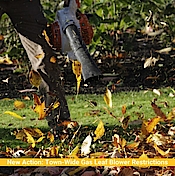
Movement away from gas-powered leaf blowers is happening in municipalities across the United States. In 2024, Sustainable Jersey introduced a new certification action: Town-Wide Gas Leaf Blower Restrictions. Lois Kraus, co-founder of Advocates for Transforming Landscaping in New Jersey (ATL-NJ) and a member of the Westfield Green Team, worked with Sustainable Princeton to spearhead the development of the action. She explained, “This action helps a municipality adopt an ordinance to reduce the use of two-stroke gas-powered leaf blowers and encourages sustainable alternatives or replacement with electric equipment. Most importantly, it helps town leaders to move thoughtfully when implementing seasonal restrictions, with input from landscapers and residents.” The action awards up to 25 points depending on the initiatives completed.
New Jersey municipalities have stepped up to enact ordinances and educate their communities on sustainable alternatives to using gas-powered equipment. Maplewood Township has entirely banned the use of gas-powered leaf blowers since January 2023. Fines for violations are on an escalating scale: $500 for the first violation; $1,000 for the second violation; and $1,500 for the third and any subsequent violations, along with potential loss of license to perform work within the Township. As of October 2023, Montclair Township enacted a total ban on gas-powered leaf blowers. Local advocacy groups (e.g., Quiet Montclair) collaborate with the local government to conduct public education efforts.
Princeton Township enacted a seasonal ban on gas-powered leaf blowers and other gas-powered lawn equipment within the municipality after a thorough stakeholder engagement process. The project team included co-partners Sustainable Princeton and the Princeton Environmental Commission, along with Unidad Latina en Acción NJ, the Latin American Legal Defense and Education Fund, Quiet Princeton, Rutgers School of Public Health, the Rutgers Environmental Stewards program and several Princeton departments and commissions.
South Orange's ordinance, passed in 2022, restricts the use of gas-powered leaf blowers from May 1 to September 30 annually. The South Orange Environmental Commission (SOEC) designed postcards to help educate residents. The South Orange Police Department provided handouts in both English and Spanish explaining the regulations. A separate postcard was also produced by the SOEC boasting the benefits of “leaving the leaves” and was given out at Community Day and various other public events.
The most recent regulation, the Borough of Glen Ridge Leaf Blower Ordinance, went into effect January 1, 2025. Regulations for gas powered leaf blowers in Glen Ridge are permitted for use seasonally from April 1 to May 15 and from October 15 to December 15. For certified communities, completion of the Town-Wide Gas Leaf Blower Restrictions Action can count toward a Gold Star Standard in Health.
Reading-Fleming Intermediate School Turns Unused Area Into a Pollinator Garden and Outdoor Classroom (Hunterdon County)
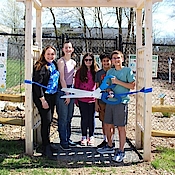
Reading-Fleming Intermediate School (RFIS) transformed an unused area of their school campus into a certified pollinator garden and outdoor classroom in just over two years.
The Readington-Fleming Intermediate School Garden earned both the National Wildlife Foundation's Certified Schoolyard Habitat status and The Watershed Institute, New Jersey Water Supply Authority and Raritan Headwaters Association River Friendly School certification in Spring 2023. The garden is a registered Monarch Waystation and a Homegrown National Park.
This impressive makeover was coordinated by RFIS teacher Lisa Coster who secured over $30,000 in grants and donations to enable students to create the wildlife habitat. Students, scout groups and volunteers from local organizations and businesses have all contributed to the various elements of the garden. The garden is about 1/10 of an acre and has a long list of features and resources, including a deer fence, an accessibility path, bat houses, bee motels, a lending library, two display cases, wheelbarrows, motion lights, student observation equipment and a small storage shed. Garden signage marks the numerous plants, areas of interest and ways to participate with the garden's many interactive features.
Next to the pollinator garden, the outdoor classroom area includes seven benches made from recycled plastic caps and lids that were molded into shape. More than 700 pounds of caps and lids were collected by the school community for this purpose. The outdoor classroom area has a display board and table where the students use magnifying tools, insect examination gadgets and reference books.
A $10,000 Sustainable Jersey for Schools Grant funded by the PSEG Foundation contributed to fencing, technology, training and curriculum development for outdoor education. The grant funded materials for the students such as waterproof clip boards, reference books and sit-upons.
“The garden provides hands-on opportunities to learn and bring our curriculum to life! Offering opportunities for students to learn outdoors through stewardship activities in the classroom and beyond the bell is so valuable. We’ve used small pockets of time and various grants to support our vision," said RFIS teacher Lisa Coster. “Right now, in addition to sowing seeds outdoors in milk jugs, students are growing seedlings and moving them into new hydroponic stations, which were funded by a 2024 Planet Stewards grant from the National Oceanic and Atmospheric Administration. Fresh veggies grown in the stations will later be shared during lunch time or sent home in take home gardens. That's over 700 milk jug gardens," Coster added.
Reading-Fleming Intermediate School achieved Sustainable Jersey for Schools certification and a Digital Schools Star in 2024: Certification Report. The school received 10 certification points for this work by completing the Sustainable Jersey for Schools action: Outdoor Classroom.
The 2025 Sustainable Jersey Grants Program funded by the PSEG Foundation is currently accepting $2,000 and $10,000 school grant applications through Friday, March 7, 2025. Consider applying for a grant for a school sustainability project today.
Sustainable Jersey for Schools Celebrates 10 Years

Sustainable Jersey for Schools is celebrating 10 years of New Jersey public schools getting certified. Since the 2015 inaugural group of 59 certified schools, a total of 566 schools have earned certification. Today, over 1,202 schools participate in the program, driving change on critical sustainability issues across New Jersey.
More than 100 best practices and performance standards have been created for schools to move toward sustainability. Each year, the Sustainable Jersey for Schools list of certification actions is updated to reflect the changing conditions in the sustainability field. Since 2015, participating schools have collectively implemented and documented more than 9,864 discrete actions from the list of best practices.
The Sustainable Jersey Grants Program has awarded over $3.5 million in grants to schools and school districts. Fifty five percent (55%) of participating school districts have received at least one grant. From implementing Education for Sustainability in the classroom and improving school district energy efficiency, to coordinating sustainable and scalable food waste solutions, participating schools and districts have been at the forefront of creating a sustainable future. They serve as learning labs for prevailing sustainability issues by identifying authentic learning opportunities for students and staff through school gardens, outdoor classrooms, aquaponics systems, waste reduction initiatives and more.
The anniversary theme, “Celebrating Progress, Envisioning the Future,” is a recognition of past accomplishments and a renewal of the mission to empower New Jersey communities to build a better world for future generations. Stay tuned for more anniversary highlights and opportunities to join in the celebration!
Make the Switch to a Cleaner and Greener Fleet
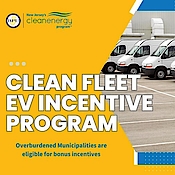
New Jersey is leading the way on electric vehicle (EV) adoption on the East Coast. New Jersey's Clean Energy Program Clean Fleet EV Incentive Program supports local, state government and nonprofit entities as they transition to EVs. The program offers incentives to eligible entities for purchasing EVs and charging equipment. Incentives are also available for fleets for the make-ready costs for charging equipment. Extra incentives are available for overburdened municipalities. Applications are accepted until funds are expended. For more information on the Clean Fleet EV Incentive Program, visit: https://chargeup.njcleanenergy.com/clean-fleet.
New Resource: Sustainable Jersey launched a Purchasing Resource Center to assist school districts and municipalities in accessing sustainable equipment and services. A key feature of the tool is that it helps users explore a wide range of alternative fuel vehicles and provides information on available EV supply equipment to support EV investments. Users can access a directory of cooperative purchasing options from state, county and collaborative organizations and a quote library showcasing eligible equipment and services customized to meet needs. To access the tool, visit: https://bit.ly/PurchasingResearchCenter.
New Jersey’s Decarbonization Efforts and Energy Efficiency Initiatives Strengthened

January 1, 2025 marked the start of the second program cycle, or Triennium 2, of New Jersey’s multi-year energy efficiency programs available through New Jersey’s seven public electric and gas utilities. In the process of supporting building decarbonization and energy conservation, these programs will prioritize low-income customers who shoulder disproportionately high energy burdens.
Established by the New Jersey Clean Energy Act of 2018, natural gas utilities must achieve energy savings of 0.75% and electric utilities must achieve energy savings of 2% of the average annual usage in the prior three years within five years of implementation of their energy efficiency programs. To date, Triennium 1 incentive programs disbursed approximately $1.25 billion in incentive payments to New Jersey’s customers. Collectively, customers have saved around $600 million on their utility bill through New Jersey’s energy efficiency programs. Triennium 1 resulted in 1.4 million metric tons of annual greenhouse gas emission reductions, which is equivalent to approximately 300,000 cars removed from the road per year.
